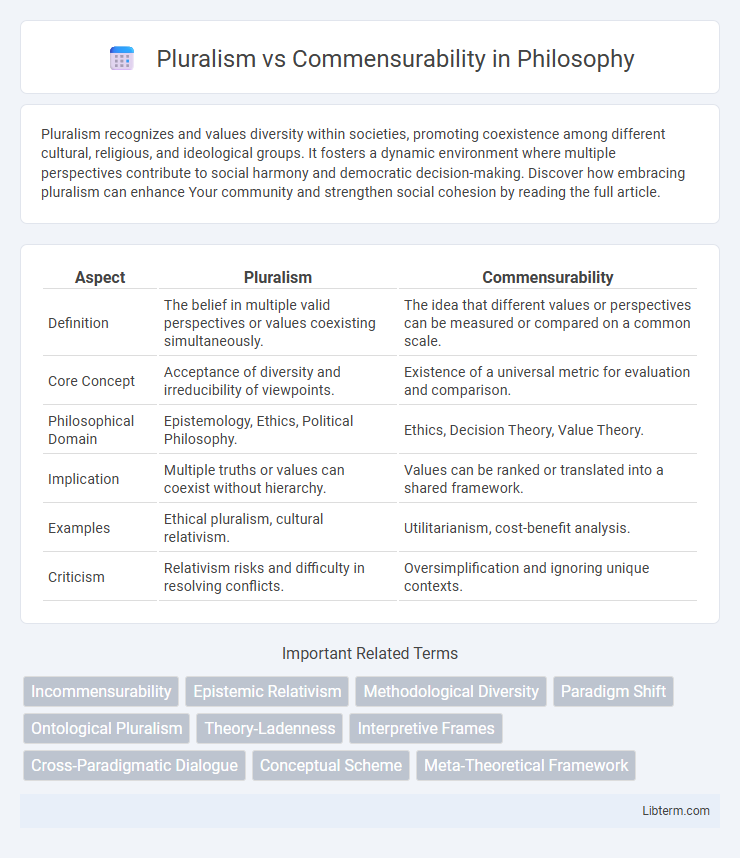Pluralism recognizes and values diversity within societies, promoting coexistence among different cultural, religious, and ideological groups. It fosters a dynamic environment where multiple perspectives contribute to social harmony and democratic decision-making. Discover how embracing pluralism can enhance Your community and strengthen social cohesion by reading the full article.
Table of Comparison
| Aspect | Pluralism | Commensurability |
|---|---|---|
| Definition | The belief in multiple valid perspectives or values coexisting simultaneously. | The idea that different values or perspectives can be measured or compared on a common scale. |
| Core Concept | Acceptance of diversity and irreducibility of viewpoints. | Existence of a universal metric for evaluation and comparison. |
| Philosophical Domain | Epistemology, Ethics, Political Philosophy. | Ethics, Decision Theory, Value Theory. |
| Implication | Multiple truths or values can coexist without hierarchy. | Values can be ranked or translated into a shared framework. |
| Examples | Ethical pluralism, cultural relativism. | Utilitarianism, cost-benefit analysis. |
| Criticism | Relativism risks and difficulty in resolving conflicts. | Oversimplification and ignoring unique contexts. |
Understanding Pluralism: Definition and Scope
Pluralism refers to the coexistence of diverse perspectives, values, or approaches within a given domain, emphasizing the acceptance and validity of multiple viewpoints without requiring them to be directly comparable or reducible to a single framework. It challenges the notion of commensurability, which demands a common measure or standard for evaluation across differing perspectives. Understanding pluralism involves recognizing its scope across disciplines like philosophy, sociology, and political theory, where it fosters tolerance, dialogue, and the coexistence of conflicting but legitimate views.
Commensurability Explained: Meaning and Implications
Commensurability refers to the ability to measure or compare different values, theories, or cultural practices using a common standard, allowing for meaningful evaluation and decision-making. In philosophical and social contexts, commensurability implies that conflicting viewpoints or moral systems can be assessed on shared criteria, fostering dialogue and integration. This concept challenges pluralism by suggesting that despite diversity, some universal benchmarks enable objective comparison and resolution of differences.
Historical Context: Pluralism and Commensurability in Philosophy
Pluralism in philosophy emerged as a response to the realization that multiple, often conflicting perspectives can coexist, reflecting diverse cultural, epistemological, and ontological frameworks throughout history. Commensurability, by contrast, gained prominence during the 20th century debates, especially through the work of Thomas Kuhn, emphasizing the possibility of translating or comparing distinct value systems and scientific paradigms within a shared evaluative framework. The historical context of these concepts reveals evolving attitudes toward understanding truth, knowledge, and reality amid shifting intellectual landscapes.
Key Differences: Pluralism Versus Commensurability
Pluralism acknowledges the coexistence of multiple, often conflicting values or truths without demanding a singular standard of judgment, emphasizing diversity and acceptance of varied perspectives. Commensurability posits that different values or beliefs can be measured against a common scale or criterion, facilitating direct comparison and evaluation. The key difference lies in pluralism's embrace of irreducible diversity versus commensurability's insistence on a shared evaluative framework.
Theoretical Foundations: Major Thinkers and Debates
Pluralism, as articulated by Isaiah Berlin, advocates for the coexistence of multiple, often conflicting values without a single ultimate truth, contrasting with Thomas Kuhn's notion of commensurability, which emphasizes the incommensurability of scientific paradigms that resist direct comparison. Karl Popper's falsificationism supports a critical engagement with competing theories, reinforcing pluralist perspectives by promoting diverse methods for scientific inquiry. Debates among these thinkers center on whether knowledge systems can be translated or measured against each other, shaping modern epistemological discussions on the limits of objectivity and the role of cultural and intellectual diversity.
Practical Applications in Society and Culture
Pluralism in society fosters diverse cultural expressions and value systems, enabling coexistence without forcing uniform agreement, which enhances social resilience and innovation. Commensurability, by contrast, seeks common metrics or criteria for evaluating differing perspectives, aiding in conflict resolution and policy formulation through shared standards. Practical applications emerge in multicultural governance, where pluralism supports inclusion, and commensurability guides consensus-building on legal, ethical, and economic issues.
Challenges and Critiques of Pluralism
Pluralism faces challenges related to its inherent tolerance of conflicting values, which can lead to difficulties in establishing clear ethical guidelines or consensus in diverse societies. Critics argue that pluralism may inadvertently foster relativism, undermining the possibility of objective truth and promoting social fragmentation. The tension between respecting multiple perspectives and achieving practical decision-making highlights the complexity of applying pluralism in political and moral contexts.
Arguments for and Against Commensurability
Arguments for commensurability emphasize the ability to measure and compare diverse values or beliefs through a common scale, facilitating decision-making and conflict resolution. Critics argue that commensurability risks oversimplifying complex, context-dependent values, leading to reductionism and loss of nuanced understanding. The pluralism perspective stresses the intrinsic incommensurability of certain values, highlighting the importance of respecting diverse frameworks without forcing uniform evaluation metrics.
Case Studies: Real-World Examples
Case studies of pluralism versus commensurability illustrate the challenges in comparing diverse values and perspectives within real-world contexts such as environmental policy, healthcare, and cultural conflicts. For instance, debates over climate change policies reveal pluralistic tensions where economic growth, ecological sustainability, and social equity resist commensurable metrics, complicating unified decision-making frameworks. In healthcare, pluralism emerges in balancing patient autonomy, medical ethics, and cost-effectiveness, demonstrating the limitations of commensurability when diverse stakeholder priorities conflict.
Future Directions in Pluralism and Commensurability Research
Future directions in pluralism and commensurability research emphasize developing integrative frameworks that reconcile diverse epistemologies while preserving methodological diversity. Advances in computational modeling and interdisciplinary methodologies enable the systematic comparison of incommensurable theories, fostering pragmatic approaches to knowledge synthesis. Emerging trends explore the role of pluralism in addressing global challenges, highlighting adaptive strategies for dynamic, context-sensitive decision-making.
Pluralism Infographic

 libterm.com
libterm.com